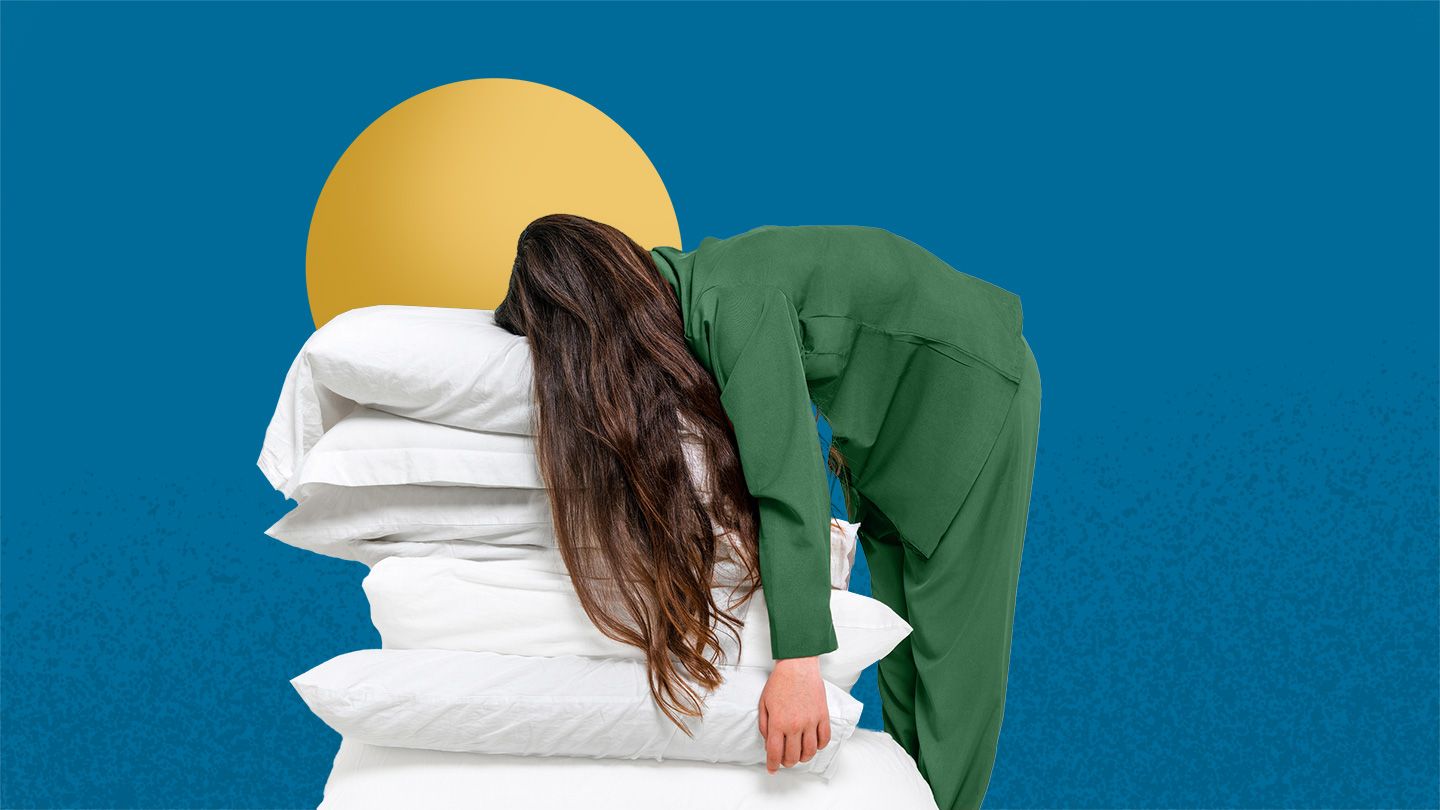We all miss out on sleep now and then, but if you’re consistently losing out on shut-eye, it could lead to a health problem called sleep deprivation. Sleep deprivation means you’re not getting enough good quality sleep in the long term. For adults, this typically means falling short of the recommended seven to nine hours nightly. When that happens regularly, it can lead to distressing symptoms and make existing health problems worse.e60dc2a1-f33c-4a05-9b50-8e3e8e597629f331dbb2-8332-4bba-8171-d0a8930778f0 The good news is, sleep deprivation can usually be treated by addressing the underlying cause.e60dc2a1-f33c-4a05-9b50-8e3e8e597629f1874f90-dcf0-43a6-9ada-ba88790ac718
Signs and Symptoms of Sleep Deprivation Symptoms Sleep deprivation symptoms can get progressively worse as time goes on.e60dc2a1-f33c-4a05-9b50-8e3e8e597629b7b656b6-e836-4b17-afe0-135b7d4204b7 Early sleep deprivation symptoms may include:e60dc2a1-f33c-4a05-9b50-8e3e8e5976290455c2c0-dfaf-4251-ae19-53ce9ea9bcb2e60dc2a1-f33c-4a05-9b50-8e3e8e5976293b6f98f8-8b69-4a8b-a0ff-cc8965115b4ee60dc2a1-f33c-4a05-9b50-8e3e8e597629bcc81346-0301-47fd-a299-87bf8ea594f3 Daytime sleepiness Fatigue Weakness or decreased physical strength Decreased ability to fight infections or getting sick more often Headaches Slowed reactions Difficulty focusing Memory problems Irritability Carbohydrate and sugar cravings Untreated sleep deprivation can lead to severe symptoms down the line, such as: e60dc2a1-f33c-4a05-9b50-8e3e8e5976292a3375cf-579e-4a88-ae6e-cf8a0f4769fee60dc2a1-f33c-4a05-9b50-8e3e8e597629df94b513-3f85-4c42-9fd8-6865db44bc49 Slurred speech Hand tremors Nystagmus (uncontrolled eye movements) Brief periods of falling asleep throughout the day that only last a few seconds (microsleeps) Ptosis (drooping eyelids) Hallucinations Poor judgment Impulsive behavior Lower pain tolerance Symptoms of depression and anxiety Over time, sleep deprivation can also increase your risk of stroke, asthma, mental health conditions like depression, and sleep disorders like insomnia .e60dc2a1-f33c-4a05-9b50-8e3e8e597629a66feffe-a103-4e90-b0df-d10f4d19512c
Causes and Risk Factors of Sleep Deprivation Causes Several factors, including lifestyle and sleep habits or other health disorders, can cause sleep deprivation.e60dc2a1-f33c-4a05-9b50-8e3e8e59762911586659-3e14-4abc-a34a-0127832cdef1 Lifestyle factors contributing to sleep deprivation may include:e60dc2a1-f33c-4a05-9b50-8e3e8e5976298516a7f4-bfc0-48a4-b2e2-7f4800a81575e60dc2a1-f33c-4a05-9b50-8e3e8e5976298bb9c7b0-b6b5-4d7a-a231-99ab48c5bb72 Shift work , especially night shifts Jet lag Traveling and sleeping in unfamiliar places, such as hotel rooms Variable sleep schedule Alcohol use or overuse Drinking caffeine late in the day Poor sleep hygiene (sleep habits) High stress Common sleep disorders linked to sleep deprivation include:e60dc2a1-f33c-4a05-9b50-8e3e8e597629e337cd0e-c115-4dac-8588-5e3fcfa29d6b Insomnia, a condition causing problems falling asleep and staying asleep Sleep apnea , a condition causing frequent incidences of shallow or stopped breathing while asleep Restless leg syndrome (RLS) , a condition causing an overwhelming urge to move the legs, usually to make unpleasant sensations like tingling or itching go away Circadian rhythm disorders , conditions involving disruptions to the body’s internal clock (circadian rhythm), which in turn can throw off your sleep schedule Parasomnias, or disruptive sleep disorders like sleepwalking Other health-related factors may also increase your risk for sleep deprivation, including:e60dc2a1-f33c-4a05-9b50-8e3e8e597629ed0f663a-eced-4f57-aa6c-2f168f4651a2e60dc2a1-f33c-4a05-9b50-8e3e8e5976295e3d75a0-1a38-4478-883a-eabad1f4902d Alzheimer’s disease Parkinson’s disease Mental health disorders, such as depression Brain injury Pain (acute or chronic) Temporary illness or infection, such as the flu Age over 65 Change in schedule A new baby
How Is Sleep Deprivation Diagnosed? Diagnosis Doctors typically diagnose sleep deprivation by asking questions about health history, symptoms, and sleep habits.e60dc2a1-f33c-4a05-9b50-8e3e8e5976298a6a1189-014a-4140-b31d-c4d9b11fc42b As mentioned, daytime drowsiness is a common sign of sleep deprivation; if you can fall asleep within five minutes of lying down during the daytime, you may have severe deprivation.e60dc2a1-f33c-4a05-9b50-8e3e8e597629af4be7e7-a39d-4377-8b95-cdfe46f19980 Because sleep deprivation treatment depends on the cause, doctors may order tests to diagnose underlying sleep disorders or other contributing factors. These may include:e60dc2a1-f33c-4a05-9b50-8e3e8e597629535c1de9-4a0e-4d23-a5ea-699ef59336ace60dc2a1-f33c-4a05-9b50-8e3e8e597629fc26683c-1a10-4c78-8637-4433c0a3c29b Polysomnography This test, also known as a sleep study , detects pauses in breathing, a common sign of sleep apnea. Actigraphy This noninvasive test tracks sleep patterns using a wearable device that detects movements while sleeping. Multiple Sleep Latency Test (MSLT) This test measures how quickly a person falls asleep during the day. Maintenance of Wakefulness Test (MWT) This test estimates a person’s ability to resist falling asleep in dull situations. Electroencephalogram (EEG) This test records brain waves and reveals unusual brain activity that could disturb sleep.
Treatment and Medication Options for Sleep Deprivation Treatment Doctors treat sleep deprivation by addressing its underlying cause. First, they often recommend tweaking your sleep habits to get better rest.e60dc2a1-f33c-4a05-9b50-8e3e8e5976297a88ddfb-3053-4292-b98f-f21ef162f576 If improved sleep habits don’t work on their own, doctors may try to identify and treat underlying medical or mental health conditions that could be causing sleep deprivation.e60dc2a1-f33c-4a05-9b50-8e3e8e597629286f943a-cd1f-4c65-8505-6b030a16af85e60dc2a1-f33c-4a05-9b50-8e3e8e5976292c313593-85f9-4d36-b0c3-fc682337b687 There are several treatment options. Medication Options Medication options for sleep deprivation may include over-the-counter sleep aids, prescription medications, or medications for mental health disorders.e60dc2a1-f33c-4a05-9b50-8e3e8e5976295abf879c-3605-47e2-9137-c9a522fc3de1 Any sleep medications you receive may vary, but doctors don’t prescribe any for long-term use. Sleeping pills become less effective over time, can be habit-forming, and may disrupt sleep with prolonged use.e60dc2a1-f33c-4a05-9b50-8e3e8e5976290ae3102a-79fd-433d-94a1-f6463e21a803e60dc2a1-f33c-4a05-9b50-8e3e8e597629bac64c30-483d-46ac-a603-a3b2cfd5c1cd Over-the-Counter Antihistamines These medications induce sleepiness by blocking histamine in the brain, which is how the brain prepares the body for sleep naturally. They include:e60dc2a1-f33c-4a05-9b50-8e3e8e597629fe54772b-ec91-4a6c-991d-93c0160132a7 diphenhydramine (Benadryl) doxylamine succinate Prescription Sleeping Pills These drugs offer stronger effects but are typically for short-term use.e60dc2a1-f33c-4a05-9b50-8e3e8e597629e7db88d3-8808-43da-a01d-f49ff3013f9f These include Z-drugs, benzodiazepines, and mental health medications. Z-Drugs (Nonbenzodiazepine Benzodiazepine Receptor Agonists) These drugs help induce sleep by slowing down brain activity:e60dc2a1-f33c-4a05-9b50-8e3e8e597629ebc3d065-c605-44bc-ae01-f91e0113ded1 They include:e60dc2a1-f33c-4a05-9b50-8e3e8e5976291bfc8cea-3d43-42b9-bff5-8ebb73d323c1 zaleplon (Sonata) zolpidem tartrate (Ambien) zolpidem tartrate extended-release (Ambien CR) eszopiclone (Lunesta) Benzodiazepines These drugs signal a brain chemical called GABA to lower anxiety, relax muscles, and cause drowsiness.e60dc2a1-f33c-4a05-9b50-8e3e8e597629a1e4e046-76ff-462b-8915-cabdb029fd23 Doctors prescribe them less often now due to their habit-forming potential.e60dc2a1-f33c-4a05-9b50-8e3e8e59762987e8b42d-6982-4236-8164-c8ee97201b07 They include:e60dc2a1-f33c-4a05-9b50-8e3e8e597629dff41507-f31e-4d12-9818-e5b94a2a3464 clonazepam (Klonopin) lorazepam (Ativan) temazepam (Restoril) Mental Health Medications Antidepressants and antipsychotics may help improve sleep by causing drowsiness in those with certain mental health conditions. Although they’re not all specifically approved by the U.S. Food and Drug Administration (FDA) for insomnia, they’re sometimes prescribed off-label for this condition. Examples include: e60dc2a1-f33c-4a05-9b50-8e3e8e59762903ffc2e0-7925-4afd-a2a7-71aa69c9569ae60dc2a1-f33c-4a05-9b50-8e3e8e5976297afda854-99b3-4b91-af2a-397a716515e2e60dc2a1-f33c-4a05-9b50-8e3e8e597629ca5d6f7c-9a8c-4a9a-80ed-178d2830cf28 amitriptyline (Elavil) nortriptyline (Pamelor) trazodone (Desyrel) mirtazapine (Remeron) quetiapine (Seroquel) doxepin (Silenor), which is also FDA-approved for insomnia Breathing Support Different forms of breathing support can help if your sleep deprivation is caused by sleep apnea. Mild sleep apnea may improve with interventions like:e60dc2a1-f33c-4a05-9b50-8e3e8e59762980fbdb8f-ed8e-4e86-a644-b786049bd761e60dc2a1-f33c-4a05-9b50-8e3e8e597629af0da9fa-8ce3-444d-8c58-c22d7a39bcd1 Weight loss Positioning with different types of pillows Mouthpieces that adjust the jaw Airway-widening surgery For mild to severe sleep apnea, positive airway pressure machines, like continuous positive airway pressure (CPAP) , can be used to keep the airways open, which helps prevent both breathing issues while you sleep and frequent awakenings caused by breathing issues.e60dc2a1-f33c-4a05-9b50-8e3e8e5976298b0456a6-2afc-40a3-b956-183d424e0ae1 Complementary and Integrative Therapies Some people may try certain complementary or integrative therapies to help them sleep better. For example, some try over-the-counter supplements like melatonin in hopes of improving sleep by regulating the sleep-wake cycle.e60dc2a1-f33c-4a05-9b50-8e3e8e597629e22d873e-ffd2-4ea4-8678-a1c320bad1c6 Valerian , an herb, has been used as a sleep aid for centuries, but studies haven’t proven its effectiveness.e60dc2a1-f33c-4a05-9b50-8e3e8e597629be1a604f-e0ff-4c2e-9be9-63754c45bf00 Doctors may recommend light therapy to help people with circadian rhythm disorders. This intervention uses strategic exposures to bright light to help regulate the body’s internal clock for better sleep .e60dc2a1-f33c-4a05-9b50-8e3e8e597629be216a17-f797-49d7-8840-f83dfb6590ae Always discuss complementary sleep therapies with a healthcare professional before trying them to make sure they’re safe for you.
Sleep Deprivation Prevention Prevention Sleep deprivation can’t always be prevented, especially if it’s associated with a medical condition or sleep disorder. But you can try to prevent temporary sleep deprivation through certain lifestyle changes.e60dc2a1-f33c-4a05-9b50-8e3e8e5976292d841f59-a401-41a3-b6f8-20d50c8b0781
Lifestyle Changes for Sleep Deprivation Lifestyle Changes As mentioned, lifestyle and sleep habit changes can lower your risk for sleep deprivation. Healthy sleep habits, or sleep hygiene, help promote high-quality sleep.e60dc2a1-f33c-4a05-9b50-8e3e8e5976293e1f4401-351c-462d-87a1-ab6a88e898fd Set and Keep a Sleep Schedule Your internal clock ( circadian rhythm ) tells your brain when it’s time to be awake and when to fall asleep. When you go to bed and wake up close to the same time each day (even on weekends), you help your circadian rhythm function better.e60dc2a1-f33c-4a05-9b50-8e3e8e5976293ebdf969-a960-4253-9375-edb299937a07 Set Up a Welcoming Sleep Space You’ll sleep best in a cool, dark, quiet, and comfortable environment.e60dc2a1-f33c-4a05-9b50-8e3e8e597629acbf6056-ed57-4d9d-b76f-5edf47da04c6 Turn your thermostat down at night, get some room-darkening shades, and invest in soft bedding. To block out sudden noises, try a sound machine or white noise app on your phone. Avoid Caffeine and Alcohol Before Bed Caffeine and alcohol can disrupt your sleep.e60dc2a1-f33c-4a05-9b50-8e3e8e597629ef868742-4d96-4786-a1a2-1948430db3f9e60dc2a1-f33c-4a05-9b50-8e3e8e597629204fe42f-3dee-4414-b03d-cb3bf6c41cb9 While caffeine may provide a quick energy boost, it can stay in your system for several hours. Everyone reacts differently to caffeine, so you may need to experiment with your cutoff time.e60dc2a1-f33c-4a05-9b50-8e3e8e597629c6129d33-61bc-49d5-8d51-c580c68f20d1 Allowing your body a few hours to process alcohol can improve sleep. Be sure to avoid nightcaps and have drinks with dinner instead.e60dc2a1-f33c-4a05-9b50-8e3e8e5976299411baaa-1cff-48ea-8636-b1e1a71f944d Build In Some Wind-Down Time In the hour before you go to bed, wind down by dimming lights, turning off screens, and trying a warm bath or mindfulness exercises.e60dc2a1-f33c-4a05-9b50-8e3e8e597629d297bb95-b19c-49ef-9f6c-405a2e442a81 Exercise Daily Exercising for at least 20 to 30 minutes a day can help you sleep better at night. But try to avoid exercising too late in the day, or it may keep you buzzing too close to bedtime. It’s usually best to do so at least five to six hours before bedtime.e60dc2a1-f33c-4a05-9b50-8e3e8e5976294ea95c38-0945-46c1-ba09-b84501ba6e6a Avoid Over-Napping Limit daytime naps to 20 minutes and take them before the afternoon to avoid impacting your nighttime sleep. Naps that are too long or too late in the day can make it harder to fall asleep at night.e60dc2a1-f33c-4a05-9b50-8e3e8e59762978a66f70-d72c-4f25-86d6-d1c78cbb4d03
Sleep Deprivation Prognosis Prognosis and Outlook Sleep deprivation is often treatable and can improve quickly in some cases. Outcomes vary depending on the severity, duration, underlying cause, and other health conditions.e60dc2a1-f33c-4a05-9b50-8e3e8e59762930ec6995-9dd1-4491-b47b-e9e36368640fe60dc2a1-f33c-4a05-9b50-8e3e8e597629475d989a-7d49-46db-8843-dafea47f5369 For example, sleep deprivation from jet lag often resolves quickly with good sleep habits, while sleep apnea-related deprivation may require longer treatment to see improvement.e60dc2a1-f33c-4a05-9b50-8e3e8e5976290f8a149d-29a8-40e8-a5ce-de42664aa113
Complications of Sleep Deprivation Complications When sleep deprivation goes on for too long, it can affect your daily life. Complications of ongoing, severe sleep deprivation include:e60dc2a1-f33c-4a05-9b50-8e3e8e597629553c452e-980d-4ffd-b8a7-8343ae660068e60dc2a1-f33c-4a05-9b50-8e3e8e59762990e48b48-a110-4023-afb9-952b6be0f40e Accidents (The U.S. sees about 6,000 fatal car crashes per year due to drowsy driving.)e60dc2a1-f33c-4a05-9b50-8e3e8e59762996fb1a56-b708-4143-9568-dc119f5d3144 Brain damage Obesity Heart disease High blood pressure Vascular disease Heart attack and stroke Anxiety and depression Diabetes Psychosis
Research and Statistics: Who Develops Sleep Deprivation? Research and Statistics Sleep deprivation affects 50 to 70 million adults in the United States, and almost every person in the world experiences sleep deprivation at least once in their life.e60dc2a1-f33c-4a05-9b50-8e3e8e5976295d493060-6cae-4114-a14d-b12f60d9d62a Older adults typically get less deep sleep than younger adults, and about half of people age 65 and older report sleeping problems.e60dc2a1-f33c-4a05-9b50-8e3e8e59762981782153-4062-4c30-9a10-84376c1e372b Although older adults tend to sleep lighter than younger adults, recent research shows that 20 percent of people 25 to 45 years old often sleep 90 minutes less per night than what they need. Experts think the societal shift toward a “24/7” culture (expectations of availability around the clock) and easy access to electronic devices could be causing sleep deprivation in young adults.e60dc2a1-f33c-4a05-9b50-8e3e8e597629ed7508ee-3fa6-482d-8488-1da2adc15af0 Research also shows women often have more trouble falling and staying asleep than men.e60dc2a1-f33c-4a05-9b50-8e3e8e597629b1efad43-158b-458f-8556-5b59049c5482 But sleep deprivation can affect anyone, and about 20 percent of U.S. adults get fewer than five hours of sleep each night.e60dc2a1-f33c-4a05-9b50-8e3e8e597629beccf5dc-2b35-424a-b734-9b374ba6b991
Disparities and Inequities in Sleep Deprivation Disparities The Centers for Disease Control and Prevention (CDC) reports that more white adults than Black adults have difficulty staying asleep. Income plays a role as well; the CDC found that those with higher incomes fell asleep more easily than those with lower incomes.e60dc2a1-f33c-4a05-9b50-8e3e8e597629063a0e06-8ff1-417b-80cf-053ba97eafa8
Related Conditions of Sleep Deprivation Related Conditions Here are some conditions with symptoms that that mimic those of sleep deprivation.e60dc2a1-f33c-4a05-9b50-8e3e8e5976298352b5cd-92ec-49c5-bfdb-c0ed9c5451c4 Chronic fatigue syndrome , a long-term condition involving constant extreme tiredness Narcolepsy , a condition involving difficulty sleeping at night and bouts of intense sleepiness during the day Substance abuse Depression Anxiety
The Takeaway Among adults, consistently getting less than seven hours of sleep may lead to daytime drowsiness, headaches, and difficulty concentrating, and increases your risk of serious health conditions like heart disease. Addressing the underlying cause of sleep deprivation is key to effective treatment, which may include improved sleep hygiene or medical intervention. While some over-the-counter supplements like melatonin may help in the short-term, it’s important to discuss any complementary therapies with your doctor before trying them to make sure they’re the most helpful option for you. If you think you may be sleep deprived, let your doctor know. They can help you develop a personalized treatment plan to improve your sleep quality.
Resources We Trust Cleveland Clinic: Here’s What Happens When You Don’t Get Enough SleepMayo Clinic: Lack of Sleep: Can It Make You Sick?Harvard Health: Why Sleep Matters: Consequences of Sleep DeficiencyJohns Hopkins Medicine: The Effects of Sleep DeprivationCedars-Sinai: Sleep Deprivation
Read the full article here
Leave a comment




